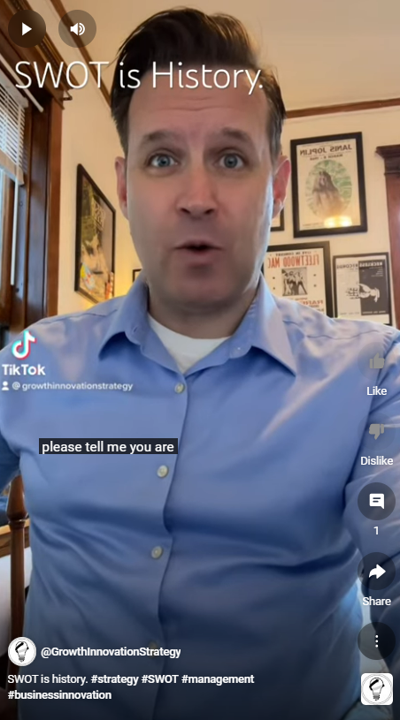Are You Still Relying on SWOT Analysis?
When SWOT was introduced, the world looked very different. Computers filled entire rooms, jets were designed for speed, not stealth, and office spaces were full of filing cabinets and typewriters. The world has evolved, yet some people are still relying on the same 1960s strategic tool to guide 21st-century decisions.
Here’s the thing: SWOT was groundbreaking in its day. It helped businesses identify internal strengths and weaknesses while also mapping external opportunities and threats. But today, strategy is far more complex, and competition is more dynamic. Industries shift, technology evolves, and customer expectations change overnight. The one-size-fits-all SWOT approach isn’t enough to keep up.
Why? Because today’s strategies need more than just a simple look at what’s happening inside and outside a business. The world is connected and constantly changing. That’s why modern strategy has moved beyond SWOT. Now, we use tools that look at what makes a company strong, how it can adapt to change, and how people’s decisions shape success. We also think about how laws, cultures, and global trends affect a company’s edge over competitors.
It's worth acknowledging: The world we work in isn’t static. It’s turbulent, uncertain, novel, and ambiguous -- TUNA.
We are not living in this world anymore.
In the 1960s, companies dominated the Fortune 500 for decades. But today, the landscape has changed dramatically. Only 49 companies have remained on the list since its start in 1955, and the average lifespan on the S&P 500 has shrunk from 33 years in 1964 to just 12 by 2027. The lesson? Adapt or disappear. Market disruption, tech innovation, and creative destruction are reshaping industries. Companies that survive are those that continuously innovate and stick to their core purpose. The future belongs to the fast and flexible, not the biggest or the oldest.
The world’s not what it was in the 1960s. Your strategies shouldn’t be either. The frameworks you choose to rely on today should reflect the complexity, agility, and speed of change we now face. It’s time to replace outdated methods like SWOT with more nuanced tools that can help you build lasting success in a world that never stops evolving.
Are you ready to step into the future? Or are you still working with the past?
You can reach GIS to talk about your strategy at strategy@growthinnovationstrategy.com.


